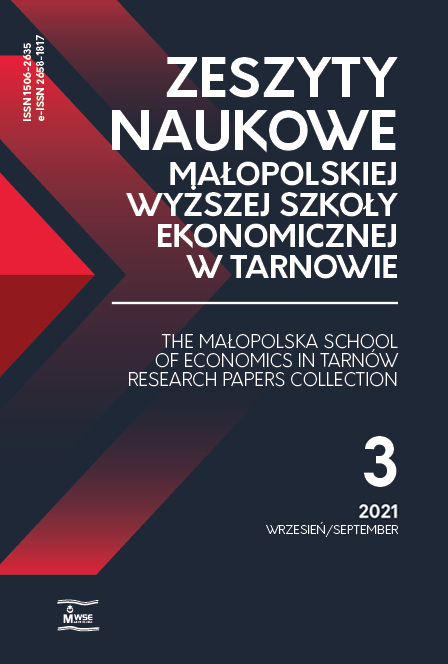Abstract
The aim of the article is to present the leadership in a company from the SME sector shown through the prism of succession in a family business. The article refers to the book edited by Monika Kosetera entitled "Polish Boss" and discus another case of leadership. The article consists of five parts. The first provides an overview of the leadership literature with an emphasis on distinguishing between the concepts and roles of manager and leader. The second part describes the methodology used to conduct the study. The next part - empirical, includes a description of the phenomenon of leadership in the examined family business in the context of the three roles it plays in the managed organization, namely in the general social, professional and organizational role. The fourth part of the article, based on the interview and analysis of documentation, was entirely devoted to the role of a leader in the analyzed organization, taking into account new opportunities and threats resulting from the COVID-19 pandemic. The last part is a summary of considerations and a discussion.
References
Babbie E. (2008). Podstawy badań społecznych. Warszawa: Wydawnictwo Naukowe PWN. ISBN 9788301151553.
View in Google Scholar
Burns, J. M. (2003). Transforming leadership: a new pursuit of happiness. New York: Grove Press. ISBN 9781555846169.
View in Google Scholar
Dionne, S., Yammarino, F., Atwater, L., Spangler, W. (2004). Transformational leadership and team performance. Journal of Organizational Change Management, 17, 177–193. DOI: 10.1108/09534810410530601.
View in Google Scholar
Fiedler, F. E. (1968). Leadership experience and leadership performance – another hypothesis shot to hell [online, dostęp: 2021-08-12]. Retrieved from: https://apps.dtic.mil/sti/pdfs/AD0684092.pdf.
View in Google Scholar
Freeman, R. E. (1984). Strategic Management: A stakeholder Approach. Boston, MA: Pitman.
View in Google Scholar
Habuda, L. (2012). W kwestii niedemokratycznej natury politycznego przywództwa. Wrocławskie Studia Politologiczne, 13, 5–22.
View in Google Scholar
Harvard Business Review Polska. (2018). Tytuł [online, dostęp: 2018-10-05]. Dostępny w Internecie: https://www.manageordie.org/post/2018/09/05/zarz%C4%85dzanie-to-nie-przyw%C3%B3dztwo oraz https://www.hbrp.pl/b/zarzadzanie-to-nie-przywodztwo/iKjmTlNX?NO_COOKIES=1.
View in Google Scholar
Karczewicz, E., Sikora, A. (2020). Absencja chorobowa w 2019 roku [online, dostęp: 2021-08-12]. Warszawa. Departament Statystyki i Prognoz Aktuarialnych. Dostępny w Internecie: https://www.zus.pl/baza-wiedzy/statystyka/opracowania-tematyczne/absencja-chorobowa.
View in Google Scholar
Kostera, M. (1996). Postmodernizm w zarządzaniu. Warszawa: Polskie Wydawnictwo Ekonomiczne. ISBN
View in Google Scholar
Kostera, M. (red.). (2012). Szef polski. Studia przypadku o roli kierownika w organizacjach. Warszawa: Wydawnictwo Akademickie Sedno Sp. z o.o. ISBN 9788363354015.
View in Google Scholar
Kotter, J. P. (2007) Przewodzenie procesowi zmian: przyczyny niepowodzeń. Harvard Business School Press ISBN 9878324609116
View in Google Scholar
Koźmiński, A. K. (2013). Ograniczone przywództwo. Warszawa: Poltext Sp. z o.o. ISBN 9788375613728.
View in Google Scholar
Lansberg I. (1983). Managing human resources in family firms: the problem of institutional overlap. Organizational Dynamics, 12(1), 39-46. DOI: 10.1016/0090-2616(83)90025-6.
View in Google Scholar
Mrówka, R. (2010). Przywództwo w organizacjach: Analiza najlepszych praktyk. Warszawa: Wolters Kluwer Polska sp. z o.o. ISBN: 9788326420009.
View in Google Scholar
Postuła, A. (2010). Informatycy i organizacje. Warszawa: Wydawnictwa Akademickie i Profesjonalne.
View in Google Scholar
Smith, D. E. (1968) K is Mentally Ill’ the Anatomy of a Factual Account. Sociology, 12(1), 23-53. DOI:10.1177/003803857801200103
View in Google Scholar
KPMG. (2016). Raport Polskiego Związku Pracodawców Budownictw pt.: Stan otoczenia biznasowego sektora budowlanego w Polsce [online, dostęp: 2021-06-01]. Dostępny w Internecie: http://pzpb.com.pl/wp-content/uploads/2016/08/PZPB-KPMG-Stan-otoczenia-biznesowego-sektora-budowlanego-w-Polsce.pdf.
View in Google Scholar

This work is licensed under a Creative Commons Attribution-NonCommercial-NoDerivatives 4.0 International License.

